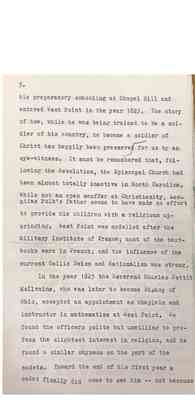Pages That Mention Polk's father
Polk Family Papers Box 1 Document
6
-5-
his preparatory schooling at Chapel Hill and entered West Point in the year 1823. The story of how, while he was being trained to be a soldier of his country, he became a soldier of Christ has happily been preserved for us by an eye-witness. It must be remembered that, following the Revolution, the Episcopal Church had been almost totally inactive in North Carolina. While not an open scoffer at Christianity, Leonidas Polk's father seems to have made no effort to provide his children with a religious upbringing. West Point was modelled after the Military Institute of France; most of the textbooks were in French; and the influence of the current Gallic Deism and Rationalism was strong.
In the year 1825 the [Reverend Charles Pettit McIlvaine]], who was later to become Bishop of Ohio, accepted an appointment as chaplain and instructor in mathematics at West Point. He found the officers polite but unwilling to profess the slightest interest in religion, and he found a similar shyness on the part of the cadets. Toward the end of his first year a cadet finally did come to see him -- not because
Polk Family Papers Box 1 Document 12
1
From THE POINTER File: Leonidas Polk official publication of the cadets at West Point. June 2, 1961
{illustration of a draped Confederate flag with a bible, a cross, and a flat-topped & flat-brimmed hat of the type associated with ministers arranged atop the draped fabric on the left and a sabre, a Cavalry hat with plume arranged on the right}
BISHOP-GENERAL OF THE CONFEDERACY
history By E. T. LECHNER
the rousing tale of leonidas polk, the minister-in-arms, in the story which took first place in the 1961 association of graduates essay contest.
. . . at the landing, are thirty-thee thousand men, Some fairly seasoned in war, but many green sticks, Grant's Army of the Tennessee. Down the river Don Carlos Buell has twenty-five thousand more In the Army of the Ohio. Opposing these Are Albert Sidney Johnston and Beauregard With something like forty thousand butternut fighters Including a martial bishop. ___
The final phrase of Benet's verse strikes a strange note. A bishop in the battlefield? How come a clergyman to the blood-soaked fields of Shiloh? Who was this figure, called by his men simply "the Bishop?" It was he who, when the massed forces of a divided country met at Shiloh, advanced with sword drawn to lead personally his gray-clad followers in four gallant charges against the Federal blue. It is hard to make "Reverend" rhyme with "General", yet the man spoken of in the verse did that - and more. He was a leader of men in two spheres of endeavor, both position demanding exacting qualities of leadership. Not only did he succeed as a soldier and as a minister, but he excelled as both. A graduate of the United States Military Academy and an Alexandria, Virginia seminary, his dual life included service as Episcopal Bishop of Louisiana and Confederate Lieutenant General. His name was Leonidas Polk.
Polk's father, a country gentleman of North Carolina, had been an officer in the Continental Army and a battle companion of Andrew Jackson. Leonidas determined to follow his father's example and began his Army career as a cadet at the Military Academy. His years at West Point were spent under the direct eye of Superindendent Thayer. Young Polk was quick to experience at the Academy what new cadets have confronted for a centery and a half. With the careful tone of reserve which was to prove so characteristic of his later life he wrote to his father,

